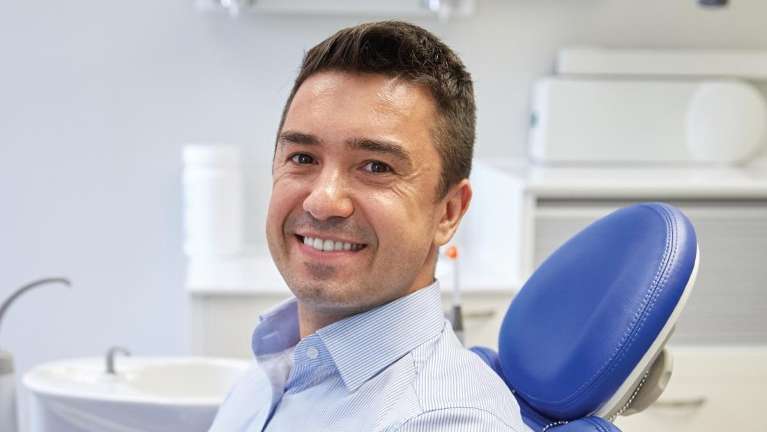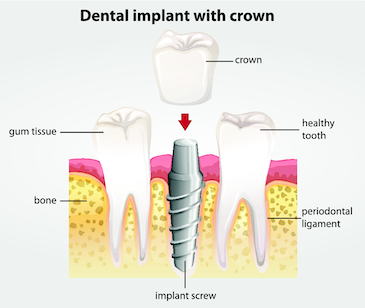
Having a tooth removed may cause you to feel some apprehension, and at Wilmette Dental Institute, we understand this. Dr Nolan Patel and our team go above and beyond to ensure your comfort during tooth extraction. We'll provide support throughout the entire process, including your recovery and beyond into tooth replacement if needed.
Understanding what happens during tooth extraction can eliminate some of the stress you feel due to anticipation, so today, we will guide you through the process step-by-step so you'll feel more comfortable and at ease on the day of your surgery.
Step #1 When Do We Recommend Tooth Extraction?
Removing a tooth is always Dr. Nolan's last resort after all other treatment options have been exhausted. While our goal is always to save your natural teeth, there are some circumstances where tooth extraction is in your best interest and will protect your health.
- A severely decayed, fractured, or damaged tooth
- Advanced periodontal disease (periodontitis)
- To eliminate crowding for orthodontic treatment
- Wisdom teeth
- An infected tooth that is not saveable with restoration
A Note about Wisdom Teeth
Many patients wonder if they need their wisdom teeth removed, and the answer in most cases is yes. Also known as third molars, wisdom teeth are your last molars to arrive when you're 18 to 25 years old. Most people don't have enough space in their mouth to support wisdom teeth successfully, and if this is the case, problems can arise, such as:
- Lack of cleanliness: It isn't easy to reach third molars at the back of your mouth to brush and floss them properly. When you can't keep them plaque-free, it increases your risk of developing problems like gum disease and tooth decay.
- Impaction: Wisdom teeth that don't erupt are impacted or stuck beneath the gumline, which can result in an infection.
- Crowding: If you don't have enough space for your wisdom teeth, they may crowd other teeth, causing them to shift and ruining previous orthodontic treatment.
- Damage: Some wisdom teeth don't come in straight and erupt at weird angles that could damage neighboring molars.
Dr. Nolan will evaluate your wisdom teeth and determine if it's in your best interest to remove them.
Step #2 The Surgical Procedure
Dr. Nolan performs comfortable tooth extractions here at our Wilmette dental office. Our goal is to help you feel at ease during your procedure, and he uses an anesthetic to numb the tooth being removed and ensure that you don't feel anything before he expertly removes your tooth.
Step #3 The Recovery Process
Immediately after your surgery, you'll bite down on gauze to control the bleeding. Dr. Nolan will prescribe some pain medication or guide you on how to use over-the-counter medicines for pain management. You'll need to arrange a ride home, and you should plan on resting for the remainder of the day.
We will provide you with complete instructions on managing your recovery process successfully. Still, there are also some general guidelines to remember to ensure a comfortable and safe recovery.
- Eat soft foods: Consume soft foods at room temperature for 24 to 48 hours after surgery. Think scrambled eggs, applesauce, and smoothies.
- Don't smoke cigarettes: Avoid straws and smoking cigarettes for at least 72 hours after surgery to keep your blood clot intact for optimal healing.
- Manage pain: Manage your pain appropriately with prescription or over-the-counter medication.
- Brush gently: Continue your home care routine, being careful not to irritate your extraction site.
- Don't exercise: Avoid exercise and vigorous activity for the first few days after surgery.
Your team at Wilmette Dental Institute is here to support your recovery process. Please get in touch with us at any time if you have questions or concerns after your tooth extraction in Wilmette.
Step #4 Tooth Replacement
 If your tooth extraction is not a wisdom tooth, Dr. Nolan will talk with you about tooth replacement options. Because of the impact tooth loss has on your dental health, it's crucial to consider replacing your tooth as soon as possible. Depending on your needs, Dr. Nolan offers options like bridges, dentures, and dental implants to restore one or more missing teeth.
If your tooth extraction is not a wisdom tooth, Dr. Nolan will talk with you about tooth replacement options. Because of the impact tooth loss has on your dental health, it's crucial to consider replacing your tooth as soon as possible. Depending on your needs, Dr. Nolan offers options like bridges, dentures, and dental implants to restore one or more missing teeth.
Why Is It Important to Replace Missing Teeth?
Besides the impact that tooth loss has on your smile, there are several dental health reasons to consider replacing your lost tooth:
- Bite stabilization: A lost tooth allows neighboring teeth to shift, causing bite misalignment that can result in tooth damage or painful jaw joint (TMJ) issues.
- Tooth alignment: Preventing tooth movement also keeps your teeth properly aligned for comfortable chewing and eating.
- Bone protection: When you lose a tooth, you also lose a root, which can result in bone deterioration, impacting the health of surrounding teeth.
Replacing a missing tooth as soon as possible restores your smile and dental health.
Contact Your Team at Wilmette Dental Institute
If you have questions about tooth extraction in Wilmette, IL, we welcome your call at (847) 251-3110.
